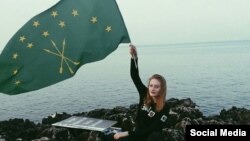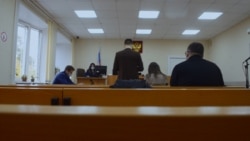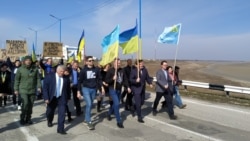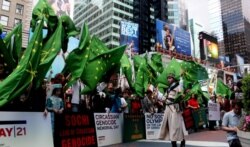President Vladimir Putin has vowed not to allow foreign ethnic conflicts to be imported to Russia. His pledge came during a March 30 briefing Putin received from Nikolai Patrushev, director of Russia’s Security Council, a Kremlin advisory body.
According to the RIA Novosti state news agency, Patrushev addressed “Western attempts to impose on Russia alien values and norms” that threaten the country’s political stability, specifically when it comes to ethnicity and religion. Patrushev recommended that Russia fight against such actions.
In response, Putin said ethnic and religious identity is an “extremely sensitive matter” and must be treated with “delicate and tactful actions.”
“We in Russia must not allow, will not allow any aggressive, disrespectful demonstration of one's ethnicity towards the representatives of any nationality,” he said, “nor will we allow any foreign conflicts of this kind to be transferred to our land.”
The statement is misleading: In fact, Russia is notorious for discrimination against ethnic and religious minorities, and its decades-long record in this regard has been well documented.
Russia has an extremism law criminalizing any incitement of ethnic and religious hatred. However, as the European Commission against Racism and Intolerance (ECRI) has shown year after year in its annual reports, this law has more often been used to prosecute and punish members of ethnic and religious minorities than to support and protect them.
As Polygraph.info and others have reported, Russia’s extremism law has been used to prosecute Jehovah’s Witnesses and Mormons.
“No steps have been taken to adopt comprehensive civil and administrative legislation against discrimination,” the ECRI reported in 2019. It also noted that “[s]ignificant amounts of racist hate speech are expressed by politicians and religious leaders” and that such “[i]ntolerant public discourse remains unchallenged and unpunished.”
The ECRI report also stated that “[r]acial profiling has not been defined and prohibited by law,” and that its use by Russian police continued to be “widespread, manifested in arbitrary identity checks and unnecessary arrests, targeting in particular migrants from Central Asia and the Caucasus, as well as Roma.”
Georgians and Ukrainians in Russia have also been the victims of intolerance and government-led discrimination due to Moscow’s political and military interventions in their countries.
Russia is home to nearly 70 ethnic groups, with ethnic Russians the largest group and recognized in the country’s constitution as the predominant one. Putin personally proposed constitutional reforms in March 2020 that enhance Russian ethnicity and Russian Orthodox Church dominance in the country’s law; Russia’s parliament promptly approved.
“Immigrants and ethnic minorities — particularly those who appear to be from the Caucasus or Central Asia — face governmental and societal discrimination and harassment. Constitutional amendments establish the primacy of the Russian language within the state, favoring by implication ethnic Russians,” the rights group Freedom House wrote in its 2021 report on Russia.
Patrushev’s warning about alleged “Western attempts to impose on Russia alien values and norms” when it comes to ethnicity and religion echoes Russian media criticism of last summer’s removal of a colonial monument near the Black Sea city of Sochi at the demand of ethnic Circassians. It also echoes last month’s protest by ethnic Tatars against statues of Yermak, the Russian conqueror of Siberia. Russian commentators have condemned these actions as “Russian BLM” – a reference to the Black Lives Matter protest movement in the United States.
Many in Russia, including government officials, reacted to last year’s BLM protests with racist slurs and mockery of U.S. authorities’ inability to suppress the movement.
The monument near Sochi was dedicated to the Russian soldiers who died fighting against the Circassians during Russia’s conquest of the Caucasus in 18th and 19th centuries. The city removed it soon after it was erected, following protests by Circassians. Russian politicians and celebrities criticized the Sochi city administration for “failing” to honor their forefathers’ legacy and “insulting the Russian nation.”
Russian media repeatedly described the incident as “importing the American BLM to Russia.”
The Tatars are a large ethnic minority in Russia and even have their own republic inside the country. They have played a prominent role in modern European politics as natives of the Crimean Peninsula, which Russia annexed from Ukraine in 2014.
The Circassians, on the other hand, are what scholars call a “hidden nation.”
As an ethnic group native to the North Caucasus, the Circassians fought Russian colonization for more than 100 years and were nearly wiped out by Tsarist Russia in late 19th century. More than third of the Circassians were killed or deported to the Ottoman Empire.
Today, their descendants live divided between three southern Russian regions and struggle to preserve their identity and culture. The Circassians also suffer from the trauma of centuries-long slavery under the Ottoman Empire and elsewhere in the Middle East and Africa.
In Russia, the government seems to perceive the Circassians' struggle to preserve their identity as a threat and responds pre-emptively. Prominent Circassians are frequently detained, arrested and prosecuted on bogus charges, or for participating in peaceful parades and rallies on Circassian Memorial Day in May, or for hosting traditional prayer under a tulip tree, sacred to the Circassians.








